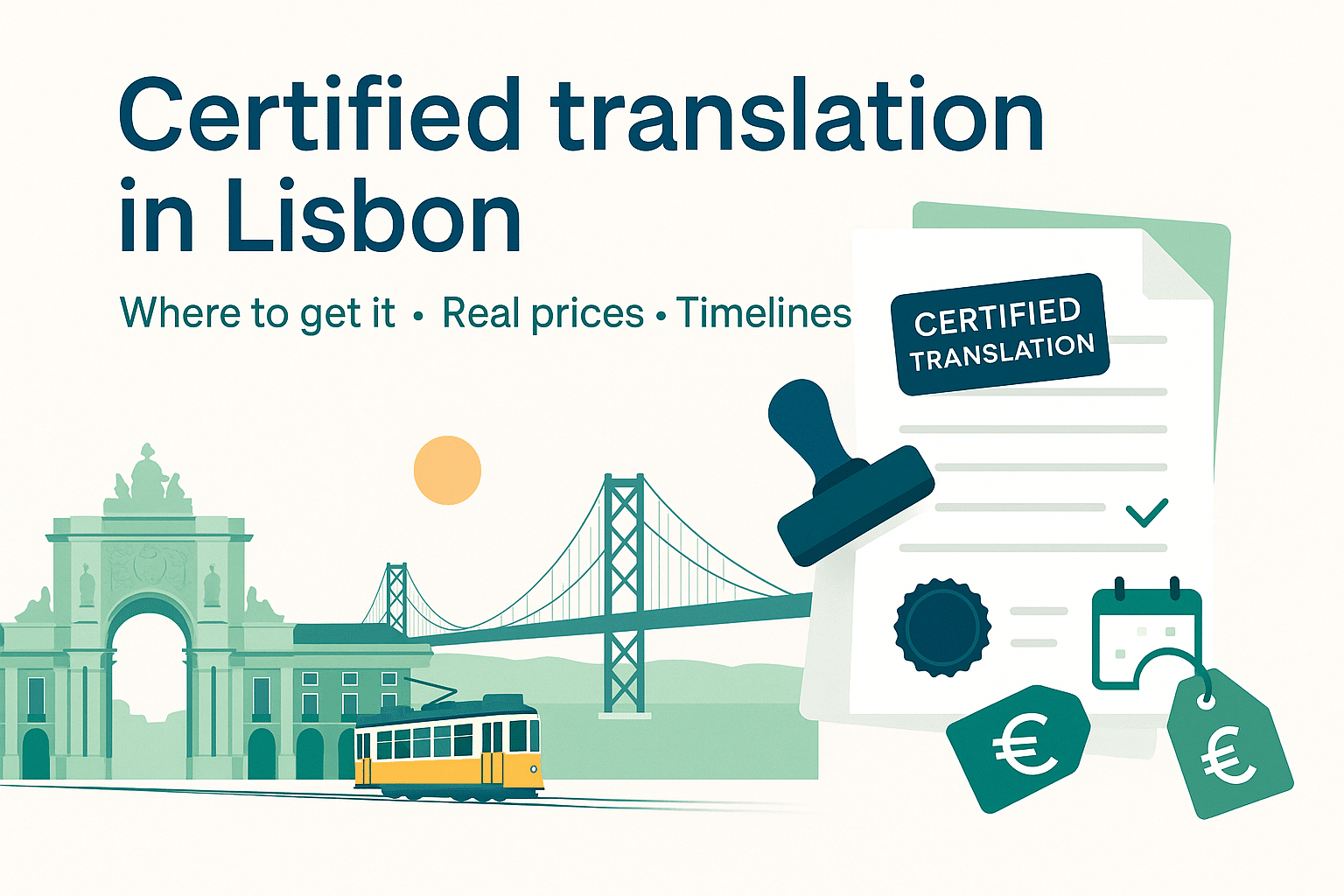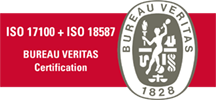Certified translation in Lisbon: where to get it, real prices and timelines
Looking for certified translation in Lisbon? Here’s where to order, what real prices look like, and typical timelines—so your documents are accepted the first time.

Table of Contents
Where to get certified translation in Lisbon
For fast, compliant results, the simplest path is a specialist translation company that provides certification end-to-end. At M21Global, our translation services and dedicated certified translations workflows handle both the linguistic work and the certification step, so you don’t have to coordinate multiple providers. This is especially helpful for bundles such as birth/marriage certificates, diplomas, or contracts.
You can also combine a translator plus a separate notary/solicitor for the paper certification. This route is common when you already have a translator you trust, but it adds handoffs and may stretch timelines. If your document will be used abroad, check whether it also needs a Hague Apostille; Portugal’s Public Prosecutor provides official guidance on when an apostille is required and where to obtain it (see the Hague Apostille guidance).
If your content is technical or legal, pick a provider with proven domain expertise. M21Global’s legal translation and technical translation teams work under ISO-17100 processes with independent review, which is often requested by universities, courts, and regulators.
How much does certified translation in Lisbon cost?
Pricing combines translation effort plus the certification step. The translation portion depends on language pair, subject-matter complexity, layout, and word count. Short civil documents (e.g., birth certificates) typically fall into a minimum-charge bracket; multi-page academic or legal sets are priced by total scope.
Expect Lisbon-area price patterns like:
- 1–2 page civil records (PT↔EN/ES/FR): usually a minimum charge for translation + certification; multi-copy sets cost more.
- Academic records & diplomas: add time for formatting and table handling; certification per set.
- Legal documents (contracts, powers, filings): domain review adds effort; certification may need extra forms.
If the document travels outside Portugal, add the Apostille fee (see IRN/Justice for current fees and notary costs on the official fees page) and outbound postage. For physical delivery, check registered mail rates (CTT’s current price list) or opt for courier.
Timelines: typical and urgent
Standard certified jobs for short civil documents are commonly completed within 1–3 business days after quote approval and file readiness. Multi-document academic or legal sets take longer, especially if you need sworn statements, notary appointments, or bundled certification. If your deadline is tight, ask for a split plan: deliver a scanned, signed certification for preview the same day and ship originals by registered mail or courier next day. For complex projects, our team can scale capacity while maintaining quality thanks to ongoing training and a documented continuous improvement program.
What makes a translation “certified”
“Certified” means the translation comes with a formal declaration tying the translator/company to the work and, where required, a notarial act. For international use, the issuing country may also require a Hague Apostille, which validates the notarial authority. Portugal’s Public Prosecutor explains which authorities issue apostilles and how the Convention works; start here if the destination authority is abroad (see Hague Apostille guidance). For risk-heavy content, our Zero Errors commitment and two-linguist review under ISO-17100 help ensure acceptance.
How to order without delays
First, gather clear scans (colour, all edges visible). If you only have photos, take them on a flat surface in good light; avoid shadows and perspective. Second, tell us exactly where the translation will be used—university, registry, court, consulate—so we apply the right certification and advise on apostille. Third, confirm spelling of names as they appear in passports or IDs; transliteration mismatches cause rework. You can request a precise quote via our certified translations page or general translation services; we translate into more than 60 languages.
Avoid common pitfalls in Lisbon
- Wrong certification type. A standard declaration may be fine domestically, but some foreign authorities require notarisation plus apostille. Confirm early with the receiving body.
- Last-minute apostille. If you plan to submit abroad, check if you need the apostille before booking flights. The Public Prosecutor’s site outlines scope and locations (see Hague Apostille guidance).
- Missing pagination and stamps. When you receive the certified set, verify page order, staples, and seals before sending.
- Assuming “machine translation + stamp” is enough. It isn’t. Certified work requires qualified linguists and QA. Our ISO framework and ongoing training protect accuracy; see our continuous improvement process and Zero Errors commitment for how quality is enforced.
If in doubt, ask. Our team will confirm the exact certification path and timeline up front through our certified translations desk.
FAQ
Q1. Do I need a sworn, certified, or notarised translation—and what’s the difference?
For everyday civil records in Portugal, a certified translation with a translator/company declaration is typically sufficient. Some institutions ask that the declaration be notarised, which is a formal act before a notary or solicitor who verifies the signer’s capacity and signature. “Sworn” is a term often used interchangeably with “certified” in Portugal; abroad, it can mean a translator who has a specific court appointment.
When your documents are destined for another country, the receiving authority may also require a Hague Apostille on the notarial act so it is recognised internationally. Because these requirements vary by destination and document type, provide the exact authority name (e.g., registry, university, court) when requesting a quote so we can configure the right path from day one.
Q2. What are realistic prices for a 1–2 page certificate set in Lisbon?
Most simple civil records (birth, marriage, criminal record) fall under a minimum charge for translation plus the paper certification. Prices then scale with language pair, formatting effort (stamps, tables), and copies. Adding an apostille incurs a government fee and time for the issuing authority; if you need physical delivery, include registered mail or courier. To avoid surprises, ask for an all-in quote listing translation, certification, optional apostille handling, and shipping. We’ll also flag any economy options (e.g., digital preview + one certified original) that keep acceptance intact while controlling cost.
Q3. How fast can I get certified translations if I’m on a deadline?
For one or two straightforward certificates, 1–3 business days after quote approval is common, provided scans are clear and names are confirmed. If you need it sooner, we can parallelise work (translation + review) and book certification slots early. For bundles (academic transcripts + diploma + supplements) or legal packs (contracts + annexes), plan extra time for QA and pagination. When time is tight, we can issue scanned certifications for your pre-checks the same day and ship originals by registered mail/courier. Tell us the submission date and location—some authorities will accept scanned certified copies as an interim measure, others won’t.
Q4. Will my certified translations be accepted abroad (EU, UK, U.S.)?
Acceptance depends on the receiving authority, not just the translator. Across the EU and beyond, most bodies accept translations that are certified + notarised when needed, and for cross-border use they may additionally require a Hague Apostille on the notarial act. We’ll confirm this during scoping. For universities and regulators, we apply ISO-17100 workflows (translate + independent review) and supply any attestations requested. If you already have a requirement sheet (e.g., from a university admissions office), share it with your files; we will align certification and delivery exactly to those specs.

